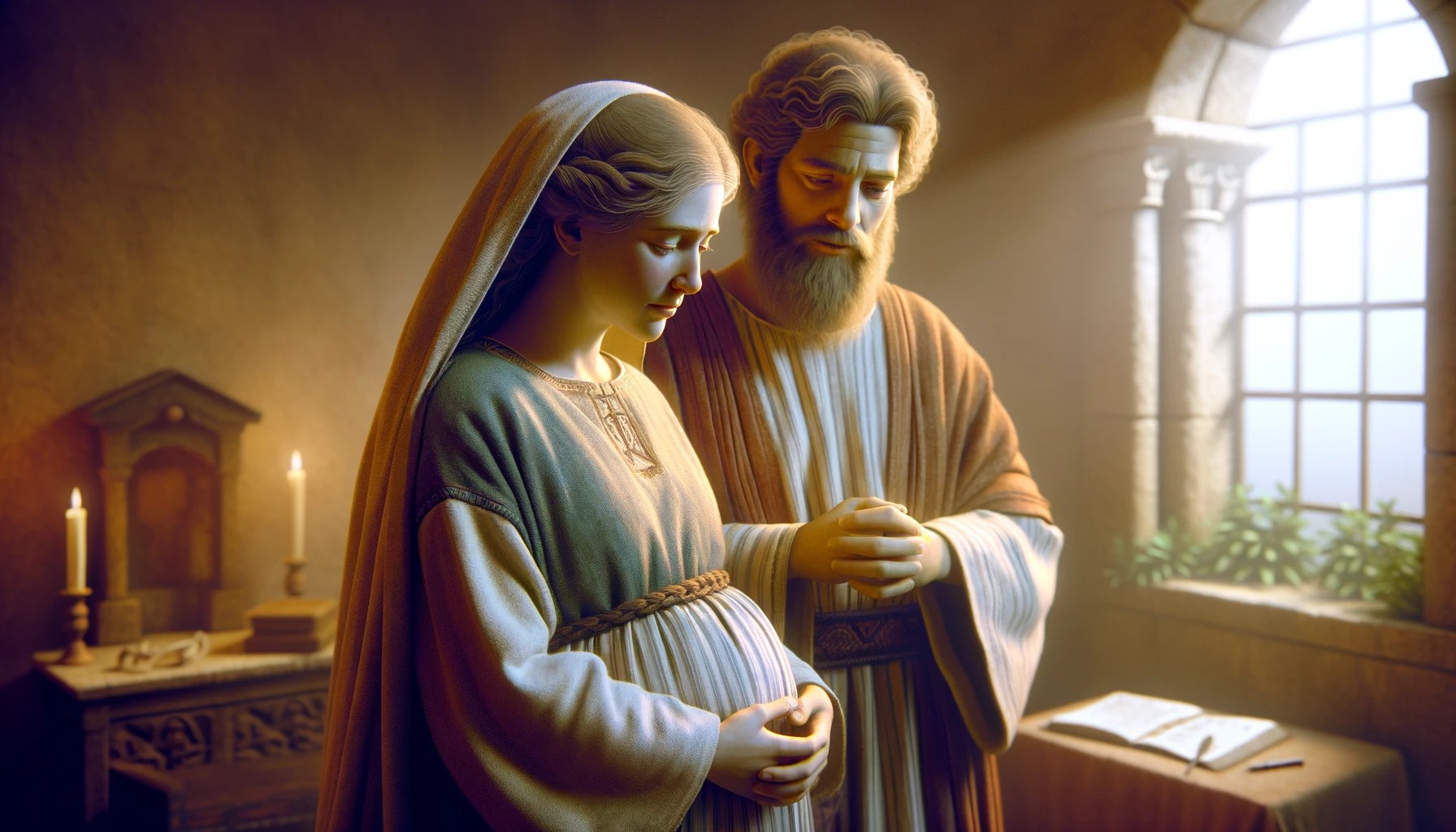Home>Christian Videos>Bible Stories>When Was Saint Elizabeth, Mother Of John The Baptist, Born?


Bible Stories
When Was Saint Elizabeth, Mother Of John The Baptist, Born?
Published: March 6, 2024
Ericka Andersen, an editor at Christian.net, expertly merges digital strategy with content creation, focusing on faith and societal issues. Her communication skills enhance the platform's engaging narratives, fostering meaningful dialogue on belief's impact on society.
Discover the birth date of Saint Elizabeth, the mother of John the Baptist, in this insightful exploration of Bible stories. Uncover the fascinating details now!
(Many of the links in this article redirect to a specific reviewed product. Your purchase of these products through affiliate links helps to generate commission for Christian.net, at no extra cost. Learn more)
Table of Contents
Introduction
When was Saint Elizabeth, mother of John the Baptist, born? This question has intrigued many believers and scholars alike. The life of Saint Elizabeth is a fascinating subject, as she played a significant role in the biblical narrative. Exploring her birth and the context of her life can provide valuable insights into the religious and historical significance of this revered figure. In this article, we will delve into the details of Saint Elizabeth's life, her family, and her pivotal role in the Bible. Let's embark on a journey to uncover the mysteries surrounding the birth of Saint Elizabeth and gain a deeper understanding of her remarkable story.
The Life of Saint Elizabeth
Saint Elizabeth, also known as Elisabeth, was a remarkable figure whose life is chronicled in the Gospel of Luke. She was a descendant of Aaron, making her a member of the priestly lineage. Elizabeth was married to Zechariah, a priest of the division of Abijah. The couple lived in the hill country of Judea and were known for their devoutness and adherence to the commandments of the Lord. Despite their piety, they were childless, which was a cause of great sorrow for them.
However, their lives took a miraculous turn when an angel of the Lord appeared to Zechariah while he was performing his priestly duties in the temple. The angel announced that Elizabeth would conceive a son, who would be named John. This divine proclamation was met with disbelief by Zechariah, who was struck mute as a sign of the angel's authority. True to the angel's words, Elizabeth conceived and bore a son in her old age, just as the angel had foretold.
Elizabeth's life was marked by faith, resilience, and unwavering devotion to God. She embraced her unexpected pregnancy with grace and gratitude, recognizing it as a divine blessing. Her faith in God's plan for her and her son, John, was unwavering, and she played a pivotal role in nurturing and guiding John in his formative years.
Elizabeth's life serves as a testament to the power of faith and the fulfillment of God's promises. Her unwavering trust in God's plan, despite the challenges and societal expectations, sets her apart as a revered figure in Christian tradition. The story of Elizabeth's life continues to inspire believers to trust in the faithfulness of God and remain steadfast in their devotion, even in the face of adversity.
The Birth of Saint Elizabeth
Saint Elizabeth's birth is not explicitly documented in the Bible; however, Christian tradition holds that she was born in the first century BC. Her birth is believed to have taken place in the hill country of Judea, a region with deep religious significance. The exact date of her birth remains a subject of speculation and historical interpretation, as the primary focus of biblical accounts is on her role as the mother of John the Baptist and her encounter with Mary, the mother of Jesus.
According to tradition, Elizabeth's birth was a testament to God's divine plan, as she was destined to play a crucial role in the fulfillment of prophecies and the preparation for the coming of the Messiah. Her birth, though not accompanied by miraculous events like those surrounding the birth of John the Baptist, is revered as a pivotal moment in the unfolding of God's redemptive narrative.
The circumstances of Elizabeth's birth are intertwined with the broader narrative of God's providence and the intricate tapestry of events that led to the fulfillment of ancient prophecies. Her birth in the priestly lineage of Aaron further underscores her significance in the religious and historical context of the time. As the daughter of devout parents, her upbringing and heritage laid the foundation for her pivotal role in the biblical narrative.
The birth of Saint Elizabeth is a testament to the intricate orchestration of God's plan and the profound impact of seemingly ordinary events in shaping the course of history. While the specifics of her birth may remain shrouded in historical ambiguity, the enduring legacy of her life and her pivotal role in the biblical narrative continue to inspire and captivate believers across generations.
The Family of Saint Elizabeth
Saint Elizabeth was born into a devout and esteemed family, tracing her lineage back to Aaron, the brother of Moses and the first high priest of Israel. Her family heritage bestowed upon her a revered status within the Jewish community, as it placed her in the priestly lineage, signifying a deep connection to the religious traditions and rituals of the time. Elizabeth's parents, whose names are not mentioned in the biblical accounts, were known for their unwavering faith and adherence to the commandments of the Lord.
Elizabeth's marriage to Zechariah, a priest of the division of Abijah, further solidified her connection to the priestly lineage. The union of Elizabeth and Zechariah, both descendants of Aaron, exemplified the intertwining of their family histories and their shared commitment to their faith. Their marriage was characterized by mutual devotion to God and a steadfast dedication to their religious duties.
The absence of children in their marriage was a source of deep sorrow for Elizabeth and Zechariah. In the cultural and religious context of the time, the inability to bear children was often perceived as a sign of divine disfavor. However, their unwavering faith and commitment to God remained unshaken, despite the societal expectations and pressures they faced.
The miraculous conception and birth of John the Baptist, their son, brought immense joy and fulfillment to their family. Elizabeth's role as a mother and Zechariah's restoration of speech following John's birth were profound manifestations of God's faithfulness and the realization of His divine plan for their family.
The family of Saint Elizabeth serves as a testament to the enduring power of faith, the fulfillment of God's promises, and the profound impact of divine intervention in the lives of believers. Their unwavering commitment to their faith and their pivotal roles in the narrative of John the Baptist's birth exemplify the profound influence of their family within the broader scope of religious history.
The Role of Saint Elizabeth in the Bible
Saint Elizabeth's role in the Bible is a testament to her pivotal significance in the narrative of the New Testament. Her most prominent role is portrayed in the Gospel of Luke, where she is depicted as the mother of John the Baptist and a key figure in the events leading up to the birth of Jesus Christ. Elizabeth's story intertwines with that of Mary, the mother of Jesus, in a profound and spiritually significant manner.
-
The Encounter with Mary: One of the most renowned episodes involving Saint Elizabeth is her encounter with Mary, as recounted in the Gospel of Luke. Following the Annunciation, when the angel Gabriel informed Mary of her divine conception, Mary visited Elizabeth, who was also miraculously pregnant with John the Baptist. The moment Mary greeted Elizabeth, the unborn John leaped in her womb, and Elizabeth was filled with the Holy Spirit. She exclaimed, "Blessed are you among women, and blessed is the child you will bear!" This encounter affirmed the divine nature of both Mary's and Elizabeth's pregnancies and underscored the profound spiritual connection between the two women.
-
The Proclamation of Blessings: Elizabeth's exclamation upon Mary's arrival, known as the "Magnificat" or "Blessedness," is a significant aspect of her role in the biblical narrative. Her words of blessing and recognition of the divine nature of Mary's child, Jesus, are revered as a profound declaration of faith and spiritual insight. This proclamation highlights Elizabeth's role as a vessel of divine revelation and her pivotal contribution to the unfolding of God's redemptive plan.
-
The Birth and Naming of John the Baptist: Elizabeth's role extends to the birth and naming of her son, John the Baptist. The miraculous circumstances surrounding John's conception and birth, as well as Zechariah's restoration of speech upon affirming John's name, further emphasize the divine orchestration of events in Elizabeth's life. Her unwavering faith and obedience to God's plan are exemplified in the fulfillment of the angel's prophecy regarding John's birth and his destined role as the forerunner of Jesus Christ.
-
The Symbolism of Hope and Fulfillment: Elizabeth's story symbolizes hope, divine intervention, and the fulfillment of ancient prophecies. Her advanced age and the miraculous conception of John the Baptist serve as a testament to God's ability to transcend natural limitations and bring forth His redemptive purposes. Elizabeth's role in the biblical narrative embodies the themes of faith, perseverance, and the profound impact of God's divine plan on the lives of His faithful servants.
Saint Elizabeth's role in the Bible transcends mere historical documentation; it embodies spiritual significance and serves as a source of inspiration for believers. Her unwavering faith, divine encounters, and pivotal contributions to the narrative of Jesus Christ's birth underscore her enduring legacy as a revered figure in Christian tradition.
Conclusion
In conclusion, the life of Saint Elizabeth, mother of John the Baptist, is a testament to the enduring power of faith, divine intervention, and the fulfillment of God's promises. While the exact date of her birth remains a subject of historical interpretation, her role in the biblical narrative is undeniably significant. From her miraculous conception of John the Baptist to her profound encounter with Mary, the mother of Jesus, Saint Elizabeth's story embodies themes of hope, faith, and the divine orchestration of events. Her unwavering devotion to God and her pivotal contributions to the unfolding of God's redemptive plan continue to inspire and captivate believers across generations. Saint Elizabeth's legacy serves as a reminder of the profound impact of individuals who wholeheartedly trust in God's faithfulness and remain steadfast in their devotion, even in the face of adversity. Her story resonates as a timeless testament to the enduring power of faith and the fulfillment of God's divine promises.














